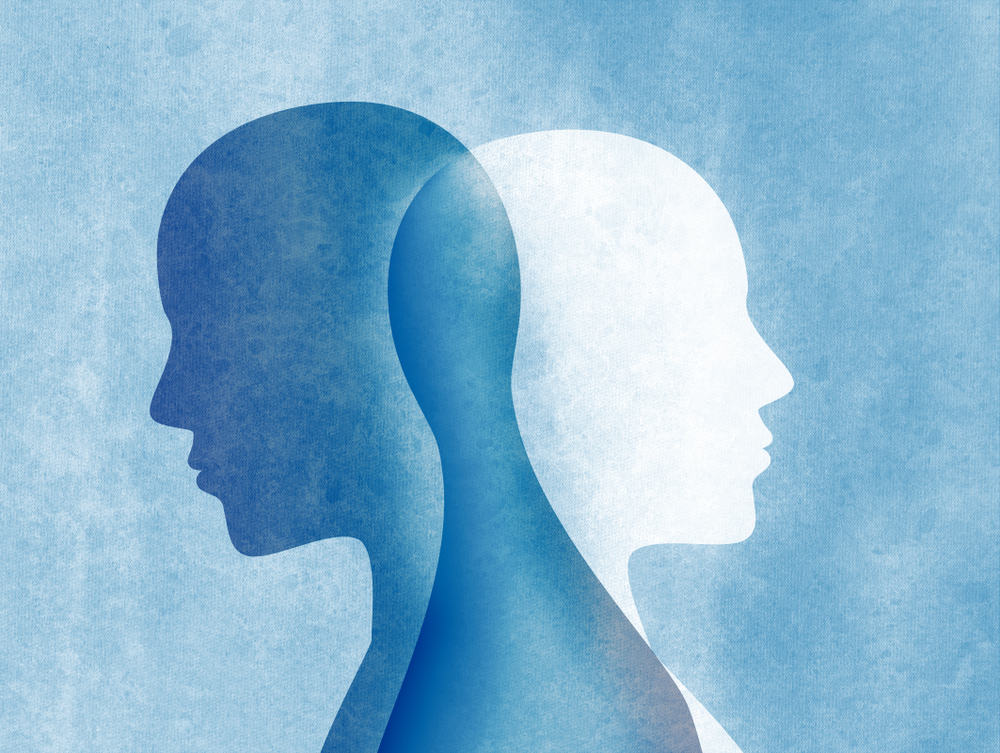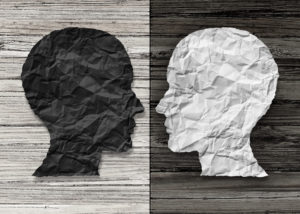Addiction and mental illness co-occur at alarming rates. While there are many possible combinations of co-occurring conditions, bipolar disorder and substance abuse are among the most common dual diagnoses. An estimated 56% of people with bipolar disorder (also known as manic depression) also battle addiction to drugs or alcohol at some point in their lives. Alcoholism is the most common form of substance use disorder (SUD), affecting roughly 45% of individuals with manic depression1.
Bipolar disorder is a severe mental illness involving sudden, drastic mood swings, behavioral shifts, and changing energy levels. The condition is typically characterized by depressive lows (also known as depression or major depressive episodes) and manic highs (also known as mania). These episodes can be relatively short-lived, lasting a few days, or they can be much longer, lasting for weeks or even months.
When coupled with drug abuse, bipolar disorder can be extremely dangerous and disruptive to a person’s life, as well as the people closest to them. Compared to the general population, those with manic depression and SUD have higher rates of injuries, violent outbursts, and suicide. The co-occurring disorders can also result in financial instability, relationship issues, family rifts, legal troubles, and problems at work.
It can be exceedingly difficult to watch a loved one suffer. If you fear someone dear to you might be battling bipolar disorder and substance abuse or addiction, turn to a rehabilitation center like Northbound Treatment for support. Confronting a family member, friend, or romantic partner about your concerns may not be easy, but being able to identify the signs can help you plead your case and guide them to an appropriate dual diagnosis treatment program.
Bipolar and Substance Abuse: Signs and Symptoms
Research suggests that when someone is bipolar and substance abuse is at play, abnormalities in their brain chemistry affect how they process and respond to the world around them2. The co-occurring conditions can impact vital body functions and psychological responses, like tiredness, wakefulness, appetite, stress levels, moods, and emotions.
With bipolar disorder, the most blatant indications are periods of mania and severe depression. When left untreated, these episodes can be alarming and potentially hazardous.
A manic episode of bipolar disorder might involve:
- Hyperactivity and high energy levels
- Feelings of excitement, elation, euphoria, or inspiration
- Perceived invincibility or remarkable strength
- Difficulty sleeping or insomnia
- Racing thoughts and inability to focus
- Excessive talking or unusual chattiness
- Irritability or agitation
- Lowered inhibitions and impulsiveness
Impulsiveness, high energy levels, and perceived invincibility can lead a bipolar individual to engage in illegal activities and other risky behaviors. For instance, they may go on a spending spree, gamble a large sum of money, drive recklessly, get into a physical altercation, or abuse drugs or alcohol.
A depressive episode of bipolar disorder might involve:
- Intense feelings of sadness and misery
- Hopelessness and pessimism
- Fatigue or a drastic drop in energy
- Sleeping more than usual or at irregular hours
- Low self-esteem or perceived worthlessness
- Feeling lonely or misunderstood
- Anger, agitation, or irritability
- Disinterest in previously enjoyable activities
- Apathy or lack of motivation
- Social isolation
- Suicidal thoughts
A major depressive episode can be agonizing. Abnormal sleeping habits, lack of motivation, and low self-esteem can make it difficult to show up to school or work. In some instances, an individual might not leave home for days or weeks at a time during a period of severe depression. And quite often, those with bipolar disorder turn to substance abuse in an attempt to numb their psychological pain.
Some of the most common signs and symptoms of substance abuse disorder include:
- Using drugs or drinking to cope with stress, grief, anxiety, or anger
- Drinking compulsively or excessively
- Passing out or blacking out frequently from drinking or using drugs
- Defensiveness about drinking or drug use
- Attempts to hide substance use and other secretive behaviors
- A high tolerance for drugs or alcohol
- Drug or alcohol cravings at all hours
- Onset of withdrawal symptoms between doses
- Withdrawing from close friends and family
- Inability to sleep or sleeping more than usual
- Stumbling or slurred speech
- Appetite loss or significant weight loss
- Shaking, twitching, or inability to sit still
- Hyperactivity or excessive talking
- Clammy palms or excessive sweating
- Bloodshot eyes, watery eyes, or small “pinpoint” pupils
- Runny nose or frequent sniffling
- Needle marks on the arms, legs, or feet
- Declining physical health or poor hygiene
The signs and symptoms of drug abuse depend heavily on the specific substance a person is using. For instance, alcohol is a depressant, so with alcohol abuse, you may notice them slurring their speech or passing out. On the other hand, methamphetamine is a stimulant, in which case you might observe hyperactivity and unusual wakefulness.
Knowing What to Look For
When someone has both bipolar disorder and drug or alcohol addiction, some of the signs are somewhat obvious, while others are more subtle. Also, it’s important to note that stress, sadness, and anger are normal parts of the human experience. Occasional anxiousness and negative emotions aren’t necessarily a cause for concern. However, frequent mood swings and prolonged episodes of mania or grief could be indicative of manic depression3.
Having said that, many of the effects of bipolar disorder and substance use disorder overlap. If you’re concerned about a loved one and think co-occurring conditions could be present, the main red flags to look for include school or work troubles, failure to meet obligations, declining physical health, poor hygiene, financial issues, and drastic behavioral changes.
School or Work Troubles
An individual with co-occurring bipolar disorder and drug addiction may perform poorly at work or school. This could include dropping grades, arriving late, difficulty showing up, or getting fired.
Failure to Meet Obligations
Someone with a severe mental health disorder and SUD may fail to meet various obligations. Outside of work and school, this could include falling back on responsibilities at home, not showing up for family members, or neglecting children.
Declining Physical Health
If your loved one is battling manic depression and substance use disorder, you might notice worsening physical health. This could include unhealthy weight loss or gain, malnourishment, lack of energy, sallow skin, or frequent bleeding.
Poor Hygiene
A person with severe drug addiction and mental illness may have poor hygiene and an overall neglected physical appearance. You might notice unkempt hair, unwashed clothing, body odor, dirty fingernails, and a general lack of grooming.
Financial Issues
An addiction to drugs or alcohol can be costly in more ways than one. Purchasing the substance of choice can be expensive, costing someone hundreds or even thousands of dollars a month. On top of that, SUD and bipolar disorder can lead to job loss or inability to work, overspending, or failure to pay bills.
Drastic Behavioral Changes
Though bipolar disorder and addiction present many predictable behavioral shifts, the conditions affect people in very different ways. Since you know your loved one best, you may notice some alarming changes in their behavior. This could include (but isn’t limited to) engaging in illegal activities, social isolation, withdrawing from friends and family, partying more than usual, taking risks, angry outbursts, or getting into physical altercations.
Helping Someone with Bipolar and Substance Use Disorder
If someone you love is showing signs of co-occurring bipolar disorder and addiction, the best way to help is to guide them to the right kind of addiction treatment program. Dual diagnosis treatment is crucial for co-occurring disorders, as treating only one condition can be unproductive and may even make things worse.
Northbound Treatment understands the complex relationship between mental illness and substance abuse. That’s why we’re proud to offer an integrated dual diagnosis rehab program at our treatment centers in Orange County. Staffed by experienced and credentialed psychiatric specialists and addiction counselors, our facilities are equipped to provide the highest quality of care for co-occurring bipolar disorder and substance abuse disorder.
Northbound Treatment Is Here for You
At Northbound, we have experience treating individuals with alcoholism and many other forms of substance use disorder. We’ve helped clients overcome addiction to prescription opioids and opiates, ADHD medication, benzodiazepines, heroin, methamphetamine, cocaine, marijuana, and designer drugs.
Northbound Treatment provides a full continuum of accessible and affordable care, including detox, residential rehab, outpatient rehab, and ongoing addiction support. We’re in-network for most insurance policies and offer flexible payment options for any remaining costs.
Call us today at (888) 978-8649 to learn more about our dual diagnosis treatment approach.
For more information about the connection between bipolar and alcohol abuse, common bipolar alcoholic traits, or for those wondering “Can Drug Abuse Cause Bipolar Disorder?”, be sure to check out our blog.
External sources:
1. https://dualdiagnosis.org/bipolar-disorder-and-addiction/
2. https://www.ncbi.nlm.nih.gov/pmc/articles/PMC3730445/











